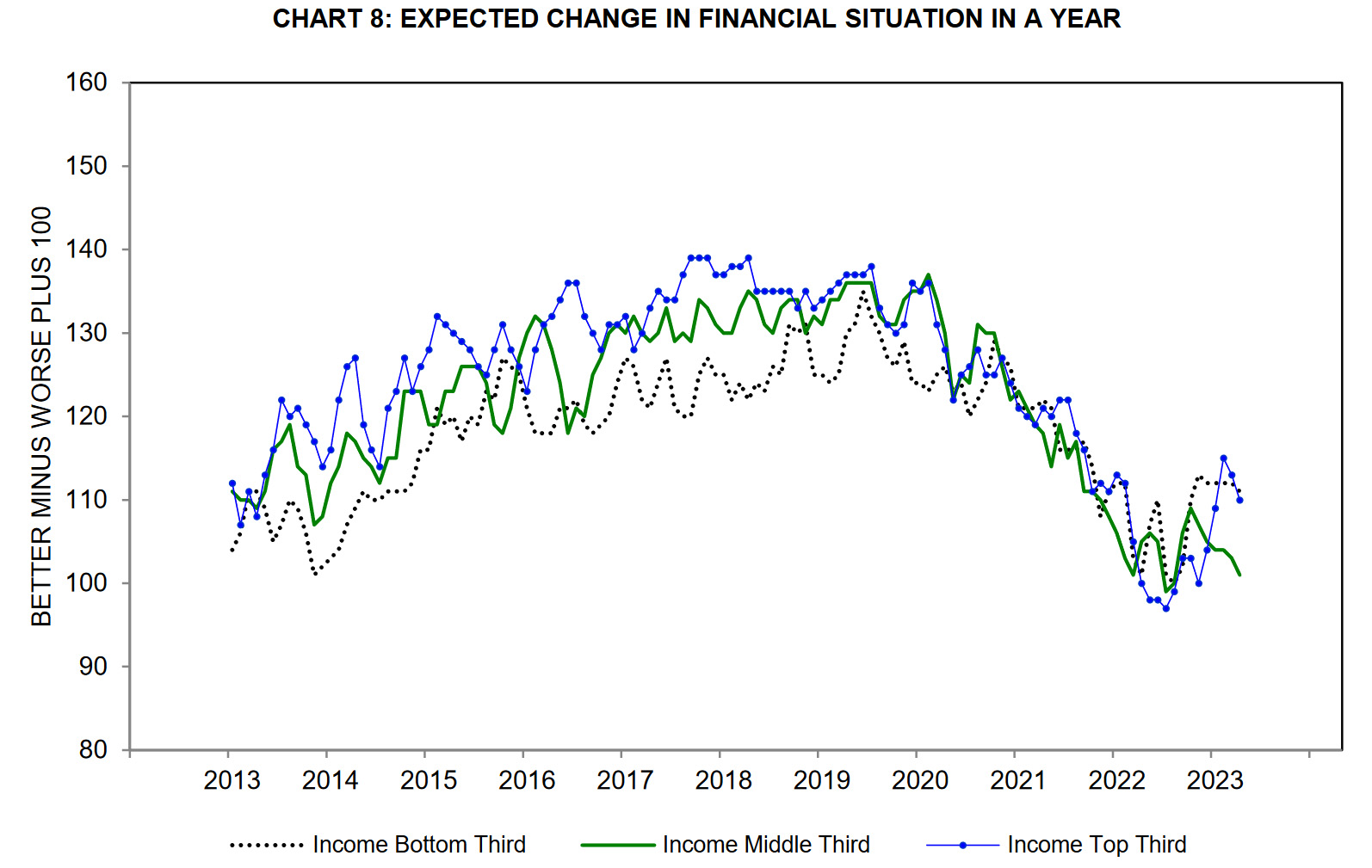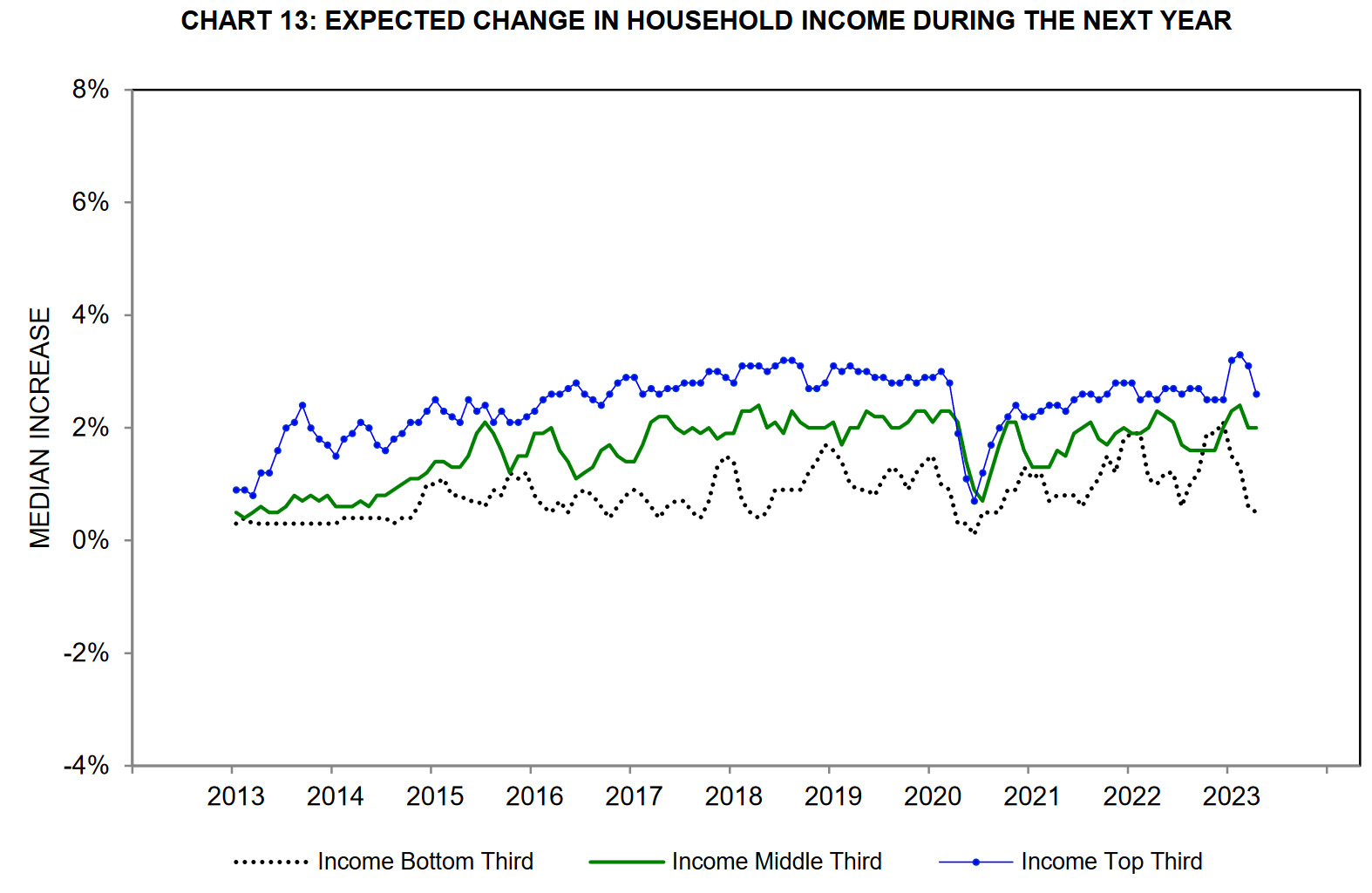Over at Vox, Emily Stewart says that over the past couple of years even "the economy’s winners feel like losers."
Historically speaking, higher-income families have consistently felt more confident about the economy than lower-income families, explained Joanne Hsu, who runs consumer surveys for the University of Michigan’s Institute for Social Research. That’s changed. “About a year ago, there started to be a convergence of sentiment by income,” she said. “We’re at very low levels of sentiment, and unlike most periods over the last 75, 80 years, higher-income and lower-income folks have similar levels of sentiment.”
This got me curious, so I clicked over to the consumer sentiment surveys that Joanne Hsu mentions. I noticed an odd thing. As an example, when you ask vaguely about "financial situation," here's what you get:
 There's a ton of noise in this series, but sure enough, if you go back five years there's a noticeable difference in optimism between rich and poor: the rich think things will get better over the coming year while poor people aren't so sure.
There's a ton of noise in this series, but sure enough, if you go back five years there's a noticeable difference in optimism between rich and poor: the rich think things will get better over the coming year while poor people aren't so sure.
Now fast forward to the recent past and just about everyone feels the same way. To the extent there's a difference at all, it's the poor who are most optimistic.
But now let's change things up. If you ask concretely about "household income," here's what you get:
 Now there's no change. Across the entire timespan the rich are more optimistic than the poor, and that remains true today.
Now there's no change. Across the entire timespan the rich are more optimistic than the poor, and that remains true today.
I diddled around non-rigorously among the charts and found roughly similar results everywhere. If you ask something concrete, there's been little change, with the rich consistently more optimistic than the poor. Unfortunately, I don't really know what this means. But I'm not so sure the affluent are really feeling like losers these days.

It may mean that the upper class point of view is being co-opted into the popular point of view of their political persuasion, as opposed to being above it all and more naturally self-confident.
No one is immune to modern media and poor education.
Seems obvious. Five years ago, Trump was POTUS and rich people were optimistic. Polarization studies show that Dem opinions of the economy are based on the actual economy and GOP opinions of the economy are based exclusively on who's president. Drum's run those charts here, right? Maybe he forgets.
Of course they're feeling precarious. Trump is leading their team but he's obviously got no chance.
An odd thing I notice is the my wife and I, up in NW WA are not seeing much growth in commodity prices. Big milk brands are quite high - almost at 6 dollars a half gallon.- A more local firm sells very good milk for half that - and it's quite good.
These results seem consistent with a story that the “merely” rich feel they are falling further and further behind the super rich, despite income gains among the former. So, while they recognize that their income might rise over the following year, the needs of maintaining a certain quality of life in order to keep up with their super rich peers forces them to overextend themselves to the point that they don’t necessarily feel any better about their general “financial situation.”
For examples of this, see the ongoing series in the New York Times that Atrios affectionately refers to as “Tales of the Not Quite Rich Enough”: that is, stories that focus on the plight of the mid-level Wall Street banker who feels that a $1 million/year salary isn’t really that much when you take into account their mortgage on their brownstone in cobble hill, private school tuition for three kids, a full-time nanny, the summer home “out east,” expensive vacations, etc. that their status in life requires.
Events in Russia is making me feel precarious!!!
Steward's point is that the rich FEEL less secure these days, not that they ARE in fact under greater threat. She answers a question and you try to rebut her by answering a different question.
As to the feeling insecure: This is perfectly compatible with the GOP feeling more oppressed and whining louder about it the more power they capture, specifically the Supreme Court.
It's costing my parents around $17,000 a month for assisted living - they cannot live in their SFH anymore they are too fragile and my house is a split level with lots of stairs and no room to even contemplate taking them in. My dad did very well, my parents are depression babies so they were frugal people and my dad's work had a generous 403b program he took advantage of. Even so his monthly annuity plus their SS checks do not cover this so they are drawing down their nest egg. Maybe they won't outlive their $$, there's still the house to be sold but wow if my parents weren't well off living below their means they'd be in a pickle right now for their last years.
If you don't feel insecure right now living in the US, you simply aren't paying attention.